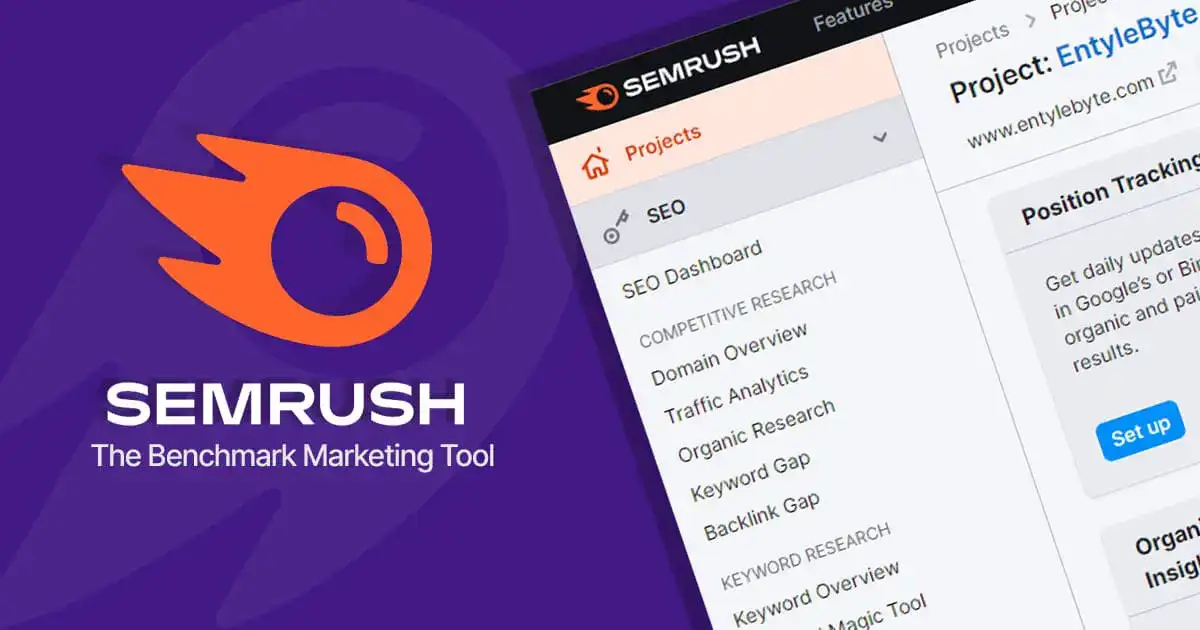Semrush vs SimilarWeb, which one is the best? Well, that is the question every webmaster and business owner asks to make their online presence more visible by tracking the insights of their performance along with their competitors.
It is a vital way and best practice to make sure that their online business is running efficiently and consistently growing and that is why it's great to utilize the tools like Semrush or SimilarWeb.
Both platforms allow you to track the most important metrics about your website or online business.
These two can be used alternatively and have their unique characteristics, but have you ever wondered among both these tools which one is more tempting and which one you should choose for your marketing practices?
Semrush Vs SimilarWeb – Which One Is The Best Tool?
In our opinion, Semrush is a more promising tool because it is an across-the-board feature and one-in-all a complete suite for improving your web permeability and finding marketing insights. This tool provides you the opportunity to utilize different features such as SEO, Keyword Research, PPC, Competitive Research, SMM, PR, Content Marketing, Marketing Insights, and Campaign Management.
SimilarWeb on the other hand is an advanced knowledge arrangement supplier for big businesses and little to mid-sized business (SMB) clients. The platform gives web analytics services and offers its clients data on their customers' and competitors' web traffic.
Why Choose Semrush Over SimilarWeb?
Here are the 14 vital reasons that will give you a clear picture and prove why you should choose Semrush over SimilarWeb.
1. Semrush VS SimilarWeb – Competitive Traffic Analysis
Semrush
Semrush has 190 geographic databases. It includes data from both devices (mobile and desktop) along with historical data of up to 4 years. The methodology of data collection is clickstream, GDPR compliant, keyword & backlink databases, and Google SERP analysis. It offers its users audience analysis, industry analysis, traffic journey analysis, competitive position map, traffic metrics for the top hundred pages of any website, and bulk analysis of up to 200 domains at once.
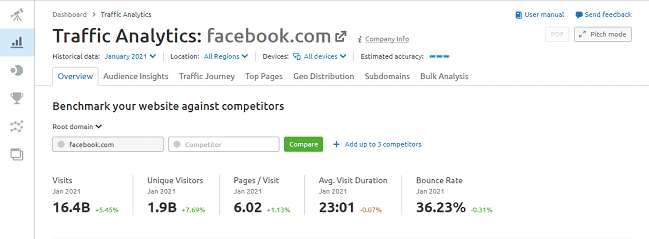
SimilarWeb
SimilarWeb has only 90 geographic databases which are available at an additional cost. It includes only desktop data; mobile data is available at an additional cost and includes historical data of up to 3 years. The methodology of data collection is clickstream, partnerships. It requires additional cost to offer its users audience analysis, industry analysis, traffic journey analysis, competitive position map, and traffic metrics for the top hundred pages of any website. It does not offer bulk analysis.

2. Semrush VS SimilarWeb – Keyword Research Tool
Semrush
The Semrush keyword tool is more advanced as you can analyze multiple keywords at the same time with many filters. The Keyword database of Semrush is 20B. It has a separate matrix for mobile and desktop keywords, question keywords, click potential, on-demand metric updates, and Search intent analysis through semantic groups.
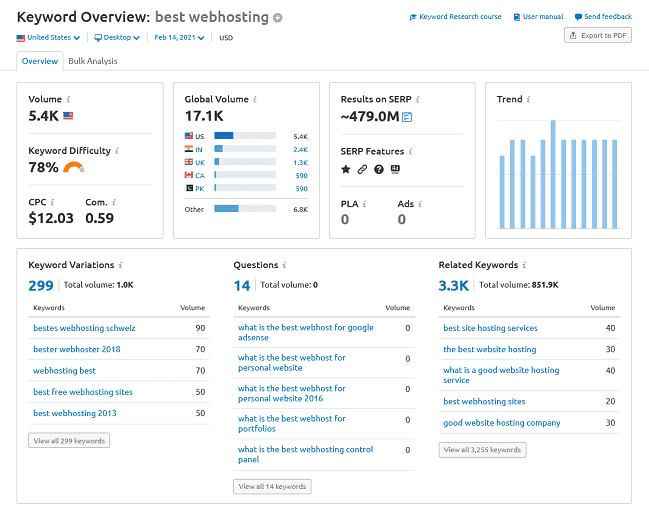
SimilarWeb
SimilarWeb keyword database is unknown. It offers organic and paid research data to its clients same as Semrush. But it does not have a Keyword difficulty score metric. On-demand metric updates and Search intent analysis through semantic groups are not available in SimilarWeb.

3. Semrush VS SimilarWeb Organic Data
Semrush
Semrush offers its users Domains’ organic/paid positions from a database of 20B keywords (and counting) based on real SERP results. It also gives users Keyword Gap Analysis, Display Advertising, PLA, SERP Features Analysis, and Bulk Analysis.

SimilarWeb
SimilarWeb shows Domains’ organic/paid positions from random clicks of actual users. It does not offer its users Keyword Gap Analysis, Display Advertising, and PLA. SERP features analysis, and Bulk Analysis is only given at an additional cost.

4. Semrush VS SimilarWeb – Content Marketing
Semrush
Semrush offers its clients many facilities in content marketing such as topic research, content audit, personalized recommendations (keyword suggestions, text length, tone of voice, readability, plagiarism), WordPress, and Google documents integration.

SimilarWeb
In SimilarWeb, content marketing facilities are comparatively less as compared to Semrush. Users are not able to use personalized features such as topic research, content audit, and many more, and also there is a limitation on the features that a user can access.

5. Semrush VS SimilarWeb – Backlinks & Databases
Semrush
Semrush gathers data from website proprietors, public sources, and partnerships. Semrush has huge catchphrases and backlinks databases, more than 20 billion keywords, and more than 40 trillion backlink data. Semrush gives more and precise data on a single page after connecting with Google Search Console.
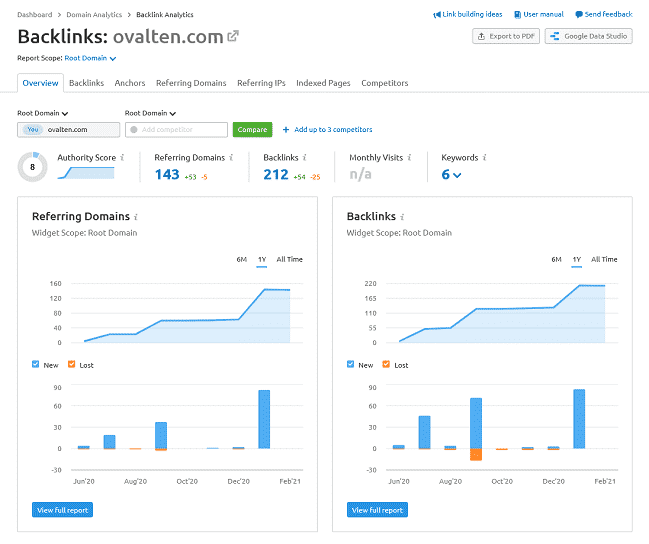
SimilarWeb
SimilarWeb gathers data from different mediums, like directly from website owners, SimilarWeb browser extensions, public data, and more. SimilarWeb claims they have been gathering 10 billion advanced digital signals day by day and two terabytes of data are broken down day by day. It can’t show basic traffic analytics and other information connected to low-traffic (less than 5k) websites. It has no backlink database. SimilarWeb lacks better integration and databases.
| S.No | Data | ||
| 1 | Google SERP Databases | 142 | – |
| 2 | Keywords Databases | 25.9B | 10B |
| 3 | Backlinks Databases | 43T+ | – |
| 4 | Apps | – | 4.7M |
• M = Million
• B = Billion
• T = Trillion
6. Semrush VS SimilarWeb – Technical SEO
Semrush
Semrush Technical SEO tool helps to understand the weaknesses of your site and provides the pedals for improvements and recommendations with clear and precise data.
Technical SEO tool allows you to perform the Site Audit for On-Page SEO with graphical “Markup Reports” and shows you exactly where your site's technical weaknesses lie.
It not only helps you to analyze every page of your site but it also offers a whole series of optimization ideas, so you can easily improve the traffic of the page concerned.

SimilarWeb
SimilarWeb Technical SEO tool also provides the same features like Site Audit, On-site SEO, and Link Building Plan but it is limited to the websites that are already published and has a great online presence.
It is not beginner-friendly. The features are not easy to use, reports are not very graphical, and are a bit complex to understand. So, if you have a new website or just starting an online business, it is recommended to use Semrush for a better understanding of Technical SEO metrics.
7. Semrush VS SimilarWeb – Accuracy
Semrush
Semrush has more accurate and current data. It has the largest keyword database. It has 142 databases in different countries. Semrush domain overview tool investigates sites and spaces and gives you data identified with the site.

SimilarWeb
SimilarWeb has almost the same data accuracy for medium and large-sized websites. SimilarWeb does not have most of the famous tools that most marketers use. It has no backlink database. SimilarWeb website performance tool has some features missing than Semrush domain overview tool, and the data is different than they are showing on test results.
8. Semrush VS SimilarWeb – Reporting & Collaboration
Semrush
Semrush offers its users Branded, white-label reports & custom themes, custom PDF reports, External sources data embedding, Reporting templates, Google Data Studio connector, and Scheduling.
SimilarWeb
SimilarWeb does not offer detailed reports with features like Branding and personalized themes. Moreover, External Sources Data embedding is available at an extra cost.
9. Semrush VS SimilarWeb – Integrations
Semrush
Semrush offers its users Google tools (Google Search Console, Google Analytics, Google Ads, Google My Business), social media tools (Facebook, Instagram, Twitter, LinkedIn, Google My Business, Pinterest, YouTube), Text editors (Google Docs, WordPress), and many others such as Zapier, Majestic, Trello.
SimilarWeb
SimilarWeb does not facilitate its clients with the integration of different social media tools, text editors, and others. Whereas the Google tools section, only offers Google Analytics to its users.
| S.No | Integrations | ||
| 1 | Google Tools | Google Search Console, Google Analytics, Google Ads, Google My Business | Google Analytics |
| 2 | Social Media | Facebook, Instagram, Twitter, LinkedIn, Pinterest, YouTube | – |
| 3 | Text Editors | Google Docs, WordPress | – |
| 4 | Others | Zapier, Majestic, Trello | – |
10. Semrush VS SimilarWeb – Advanced Features
Semrush
Semrush has more advanced SEO tools, features, and facilities that are not available on SimilarWeb. It uses multiple data sources to provide better traffic analytics, insight, historical data, keyword analytics, and more.
It is better as it has social media marketing tools, like social media post scheduling, Facebook AD campaign management social media performance tracking, and more.
SimilarWeb
SimilarWeb lacks many tools and features that are available on Semrush, and also are more often outdated. That’s the main reason that Semrush has an edge over SimilarWeb because they have an updated suite of tools and features.
11. Semrush VS SimilarWeb – API Access and Addons
Semrush
Semrush provides API access to traffic, organic and paid results, competitors, top domains, keyword research, backlinks, position tracking, and technical health. There are more add-ons that you can purchase on Semrush, such as Trends Growth Kit, E-commerce Keyword Analytics, Instant Banner Generator, Mobile App Insight, Agency Growth Kit, Semrush Local, Content Marketplace, Video Rank Tracker, Amazon Tools, Agency Partners platform (For Find Finding SEOs).
SimilarWeb
In SimilarWeb you will get access only to the regional data phase, for other countries you have to pay separately. SimilarWeb does have some add-ons like Shopper Intelligence, Sales Intelligence, and Investor Intelligence.
12. Semrush VS SimilarWeb – No. Of Tools
Semrush
Semrush offers more than 50+ tools for growing your online business and for marketing purposes. They offer more comprehensive detailed traffic analytic tools for website traffic stats sources SEO, PPC, content marketing, competitor research, Amazon tools, and social media marketing platforms.
SimilarWeb
SimilarWeb only focuses on website statics and it is not a marketing platform. It does not have any social media or content marketing tools. SimilarWeb User Interface is one of a kind yet not as quick enough as Semrush. SimilarWeb has a bot-hindering framework, and that isn't extremely wonderful.
13. Semrush VS SimilarWeb – User Trust & Reviews
Semrush
Semrush is quite possibly the most trusted and amazing asset for promoting, not just for Digital advertising, it even assistance for the local domain. Out of 5 Semrush is rated 4.5 stars on G2.com and Trustpilot.com. Over 7 million Professionals & 30% of the top companies use Semrush and their marketing tools.

SimilarWeb
SimilarWeb is not the top priority for professionals because of its outdated tools. It is not the most trusted marketing tool by professionals. Out of 5 stars, SimilarWeb is rated 4.3 stars on G2.com and 2.3 stars on Trustpilot.com.
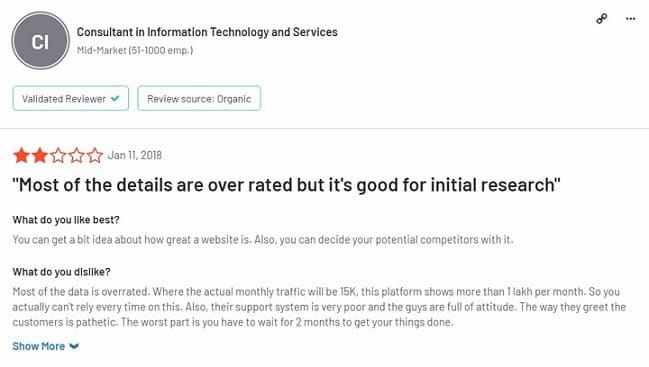
14. Semrush VS SimilarWeb – Pricing
Semrush
Semrush has clear and transparent and comparatively cheaper pricing. They offer three different price plans with core SEO tools that are PRO, GURU, and BUSINESS. You can upgrade, downgrade, and cancel your subscription whenever you want. The sales team helps in management if you want a custom quote.
SimilarWeb
SimilarWeb is complicated in terms of pricing and has no price tags on its site. The only way to know prices is to contact their support team. You have to pay separately for regional databases. They give you five options to choose from that are Digital research, Digital marketing, Shopper, investor, and Sales. You have to choose it very specifically because once you choose one option you cannot modify it.
Semrush VS SimilarWeb – Comparison Chart
Last but not least, here is the summary of all the above features explained and the overall rating of Semrush VS SimilarWeb, take a look:
| Semrush VS SimilarWeb | ||
| Features | ||
| Data Sources | 8.2 | 6.9 |
| Marketing Metrics | 8.5 | 8.1 |
| Keyword Suggestions | 9.0 | 8.6 |
| Competitive Intelligence | ||
| Web Tracking | 8.7 | 7.5 |
| Benchmarking | 8.2 | 6.9 |
| Role Management | 8.3 | 8.3 |
| Reports | 8.5 | 7.8 |
| Quality of Support | 8.5 | 8.5 |
| Overall Rating | 9.0 | 8.1 |
Semrush VS SimilarWeb – Conclusion
Semrush is better than SimilarWeb in many ways and it has more trust from its users for its transparent details.
For digital marketers, SimilarWeb is good but it’s healthier to prefer Semrush.
Semrush traffic analytics is best and has more advanced competitive analysis with a bigger, larger, and more accurate database. Also, its social tracker tool digs deeper and provides more valuable data.
It has a superior keyword research tool that gives easy access to Top Pages & Traffic Data.
Semrush also has clear crystal pricing plans which makes it better competent.
With all these features and advancements, our recommendation is to choose Semrush over SimilarWeb.
Get Started







